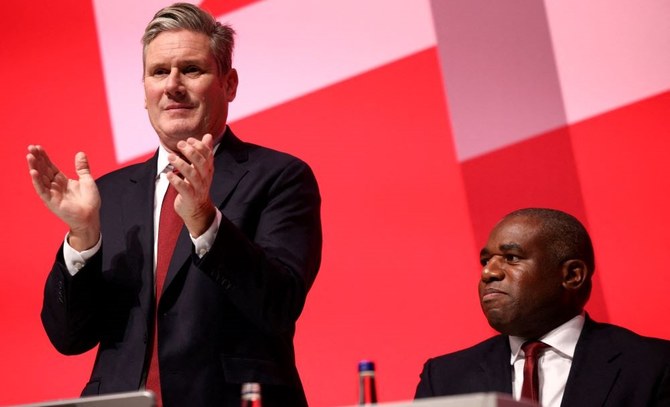Has Starmer’s shift on Gaza come too late?

https://arab.news/bjsqj
Britain’s opposition Labour Party has made its most critical comments yet toward Israel since the Gaza war began. Shadow Foreign Secretary David Lammy described the death and destruction as, “intolerable,” while, a few days earlier, opposition leader Keir Starmer stated that “far too many innocent Palestinians … have been killed as part of military operations.” On Sunday, Labour front bencher Wes Streeting called for a “sustainable” ceasefire.
This is a comparative shift by Labour, whose leadership has continually emphasized Israel’s right to self-defense in Gaza and resisted pressure to publicly call for a ceasefire in the conflict. While this largely echoes the stance of Britain’s Conservative government, it has proven a more controversial position for Labour, due to the pro-Palestinian position of many of its members.
Dozens of Labour local government councilors have resigned over what they see as Starmer’s pro-Israel stance. Barely a month after the conflict began, the leaders of two Labour councils resigned and called on Starmer to stand down as leader. Other senior figures criticized the Labour leader’s position, including the mayors of London and Manchester, Sadiq Khan and Andy Burnham, respectively, as well as the Scottish Labour leader Anas Sarwar.
The height of internal protest appeared to come in mid-November, when 56 of Starmer’s own MPs defied him to vote for an (ultimately unsuccessful) parliamentary motion calling for a ceasefire, which was proposed by the Scottish National Party. Ten of the Labour front bench team opted to resign from their positions to rebel against Starmer, in what was seen as a potential blow to his authority. Even so, the leader held firm in opposing a ceasefire.
There appears to have been a political logic behind Starmer’s position until now. His predecessor, Jeremy Corbyn, was famously pro-Palestinian — a position that some believe contributed to the party being engulfed in an antisemitism scandal under his watch. Starmer’s support for Israel’s right to attack Gaza is interpreted by many as distancing the party from the Corbyn years: underlining a decisive move away from past antisemitism and, more broadly, a rejection of Corbyn’s leftism.
Starmer has also emphasized his security credentials in recent years and supporting Israel’s right to defeat Hamas “terrorists” may be a nod to security-conscious voters. Moreover, he knows that, if he becomes prime minister, Britain’s relationship with the US will remain key and the Labour position on Gaza has closely followed the White House’s.
Indeed, this Atlanticism might explain the recent criticism of Israel more than any desire to appease pro-Palestinian Labour members. Lammy’s comments, as well as criticizing the extent of Israel’s destruction in Gaza, focused on the West Bank, urging the UK government to sanction extremist Jewish settlers responsible for an upsurge in violence there. It is no coincidence that this statement came days after the Biden administration had imposed similar punishments on settlers in a rare US move against Israel. Similarly, Labour’s shift comes at a time when the US is also displaying growing impatience with Israeli Prime Minister Benjamin Netanyahu, with Biden suggesting Israel is “losing global support.”
While hugging the US close might be an understandable geopolitical strategy for Labour, is there a risk that this minor shift on Gaza is viewed as too little, too late by the UK’s pro-Palestinian voices? London and other British cities have seen regular demonstrations since the war began of up to several hundred thousand demanding a ceasefire. Some have speculated that this antiwar feeling, especially in constituencies with large numbers of Muslim voters, might cost Starmer in the next general election.
However, Prof. Rob Ford of the University of Manchester suggests the threat is overstated. Writing for UK in a Changing Europe, he pointed to recent polls suggesting that, despite Muslim voters disapproving of Starmer’s Gaza stance, they are more unhappy with Prime Minister Rishi Sunak’s position. According to the poll, commissioned by Savanta, 69 percent of Muslim voters asked were dissatisfied with Sunak, compared to just 45 percent with Starmer.
Dozens of Labour local government councilors have resigned over what they see as Starmer’s pro-Israel stance.
Christopher Phillips
Moreover, he states that the Muslim voters polled listed domestic issues as greater electoral priorities to them than the war. The poll suggested that the cost of living, the National Health Service and the economy all ranked as more important than Gaza, even though the Israel-Palestine conflict did rank fourth as a priority issue. Indeed, past precedent has suggested that, even when passions are running high, foreign policy rarely determines British elections. Tony Blair still won reelection in 2005, despite more than 2 million people marching in the streets to oppose his invasion of Iraq two years earlier. Ford notes that, in a YouGov poll in November, only one in 10 voters regarded foreign policy as a top electoral issue.
The risks for Starmer are, therefore, more long-term. Barring an unexpected collapse in his support, which Gaza looks unlikely to impact, he will become the UK prime minister when the next election is held, sometime before late January 2025. But the Gaza conflict, and Starmer’s reluctance to call for a ceasefire, has reopened wounds within the Labour Party. Already, the left of the party has been disappointed by his shift to the right since becoming leader, believing he broke promises made to be inclusive. Gaza adds to that frustration.
While they will likely not impact Labour’s imminent coming to power, they hold the potential to blow up and fragment the party once in government. As the Conservatives are currently seeing, such factions can prove highly damaging when in power. Starmer’s stance on Gaza might make short-term political sense, but it carries a long-term risk.
- Christopher Phillips is professor of international relations at Queen Mary University of London, author of “The Battle for Syria” and co-editor of “What Next for Britain in the Middle East?” Twitter: @cjophillips










































